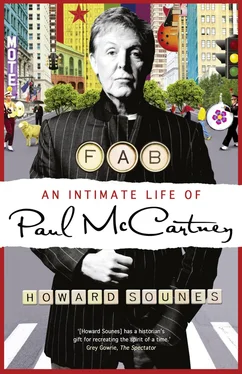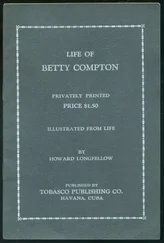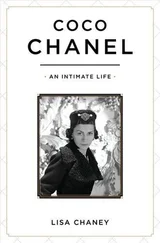In the wee small hours of the morning, after most of the patrons had left, the Beatles slowed into a semi-somnolent blues jam, playing for themselves and their friends, that is musicians from other visiting bands and club workers like Rosi and Ruth, the girls coming round from behind the bar to jive. Despite being engaged to one of the waiters, and even though Paul had Dot waiting for him in Liverpool, Ruth Lallemann says she began to date Paul, and continued to do so throughout his time in Hamburg, though they never actually had sex: ‘I never slept with him. Just kissing.’ There were, however, other German girlfriends.
At first the barmaids struggled to communicate with the boys. Paul spoke a little German, having studied the language at the Liverpool Institute, but it was English they mostly all spoke, the girls’ stilted questions met by the Beatles’ outrageous cheek, which the barmaids gradually began to understand and laugh at, copying their Scouse phrases and swear-words. Soon they were bantering back and forth in cheerful obscenity. ‘We were all fucking this, fucking that,’ laughs Ruth. ‘We asked them to write the song lyrics down, and they wrote really dirty words, and they were singing them on stage.’ After work the friends sometimes shared a cab to the beach, where they spent the last days of summer together, returning to Hamburg for work in the evening. It was a happy time. Then the Beatles found a new set of German friends.
THE EXIS
There was a breath of autumn in the air when a fey young graphic artist named Klaus Voormann descended to the Kaiserkeller, taking a seat in one of the quaint half-boats arranged in front of the stage. He looked up to see the Beatles performing ‘Hippy Hippy Shake’. Delighted by this exuberant music, Klaus rushed home to tell his sweetheart, Astrid, with whom he had just had a fight. They patched up their differences and returned the following evening with their friend, Jürgen Vollmer.
Klaus Voormann and Astrid Kirchherr, both 22, had known each other since art school in Hamburg, where they also met Jürgen. Klaus made exquisite line drawings in the style of Aubrey Beardsley, whose androgynous figures he and Jürgen resembled. Astrid was striking in her own way, a slim woman in black with cropped blonde hair, a wide mouth and a chilly Teutonic manner. One could imagine her barking ‘Sieg Heil!’ and indeed she had done so at school during the Second World War, thinking it meant something like ‘How do you do?’ As with many Germans who were children during the war, Astrid, Klaus and Jürgen had little understanding of the politics of the recent conflict, though it had affected all their lives profoundly: Jürgen’s father was an army officer killed during the Siege of Stalingrad, for example; Astrid’s brother died of dysentery as the family fled the invading Soviet army in 1945. After the madness of the war, the adult survivors rebuilt a Germany that was subdued and conservative, where everything worked efficiently, and where to say something was in ordnung (in proper order) was to give high praise, but where there was precious little excitement. Germany had had enough excitement. To younger people coming to adulthood, the generation of Astrid, Jürgen and Klaus, this new Germany seemed dull. ‘Like every teenager, we wanted to have fun,’ notes Jürgen. They looked to neighbouring France, especially Paris, where Jean-Paul Sartre and Jean Genet led the existentialist movement, and styled themselves Exis in honour of these free-living French intellectuals, though they understood little of existentialist philosophy. It was more a shorthand for dressing in black and adopting bohemian ways.
So it was that three young, self-conscious, middle-class Germans sat in a half-boat watching the crazy Englishmen at the Kaiserkeller. As Astrid recalls, Paul was the most animated that first night:
He was jumping up and down, and pulling faces when he was singing, and shook his head … The others were just standing there. Stuart didn’t move at all. John only moved a little bit, when he sang. And George just tapped his foot … The only one who was a professional entertainer was Paul.
During a set break, Klaus introduced himself and his friends shyly in broken English. The musicians admired their clothes. Jürgen said he bought all his clothes at the Paris flea markets. Detecting pomposity, John plucked an imaginary flea off Jürgen’s coat and pretended to flick it at Paul, who flinched.
John noted Jürgen’s floppy haircut, asking if he had it done in Paris. ‘No, I cut it myself.’
‘Funny looking, ain’t it, George?’
‘It is.’
‘Would look good on Paul, though,’ said John, putting a comb under Paul’s nose to make a Hitler face.
Despite the bad-taste jokes and sarcasm, which was John’s stock in trade, the Exis and the Beatles liked each other immediately. Astrid, Klaus and Jürgen were bright, arty middle-class young people of the type John and Stu had mixed with at college in Liverpool, while grammar school boys Paul and George could also relate to them. Deep down they also sensed a mutual insecurity here in the red light district of a tough port city, and henceforth took comfort in each others’ company, meeting in the cafés and bars of St Pauli during the day and nightly in the club, where the Beatles’ other, more down-to-earth German friends, Horsti the pimp and bar girls Rosi and Ruth looked askance at the interlopers. ‘We didn’t like them, because they were always very posh,’ says barmaid Rosi Haitmann, though she had to admit Astrid had charisma. When Astrid walked into the Kaiserkeller, it was like ‘the Queen came, with her entourage’. Staff buzzed around the Exis because they had money, but mocked them behind their backs. ‘I thought, “Oh my God, you fucking cunt!”’ recalls Rosi, laughing at their pretentious conversation. Pete Best was also excluded from this new friendship, not being quite as sophisticated as the other Beatles, while Stu stood apart from the boys for his lack of musical ability, having failed to improve as their bassist. This was a source of growing frustration to Paul in particular. ‘Paul and George occasionally gave Stuart an angry look, because he must have played some wrong chord,’ recalls Jürgen. ‘Stuart was always an outsider, that didn’t really fit in. But [we] liked Stuart a lot. He was more like us: he was not a rock ’n’ roll musician, he was a talented artist.’
Klaus was the only real artist among the Germans. Astrid and Jürgen had been to art college, but now worked as assistants to a Hamburg photographer. Astrid took pictures herself and told the Beatles she wanted to conduct a photo session with them. The boys were flattered, Paul discussing with Klaus what he should wear. He chose a dark sports jacket with pinstripes, his hair combed back rocker-style. Astrid posed the five English boys against fairground machinery in the nearby park, the Heiligengeistfeld. Lacking much English, she manipulated the lads with her hands, like mannequins, tilting their heads this way and that. As she touched Stuart’s face, Astrid felt a frisson of excitement. She resolved to learn English as soon as possible so she could communicate properly with this boy.
In emulation of their new Exi friends, the Beatles started to dress differently, acquiring black leather jackets and leather trousers to replace their lilac stage jackets, which they’d already worn to destruction, the leathers giving them a new, macho look. Underneath the leather the Beatles were still nicely-brought-up young men who craved home comforts, so they were all grateful when Astrid took them home to meet Mummy in the suburb of Altona. ‘They loved mashed potatoes and peas and steak and things like that. So Mummy did all that for them, and a nice cup of tea, which they couldn’t hardly get in Hamburg.’ The Beatles were on their best behaviour during these Altona visits, not least Paul, in whom Jim and Mary McCartney had instilled good manners. ‘Paul was very, very polite to my mummy.’ The Beatles were slightly surprised to discover that Astrid lived in a self-contained studio flat at the top of her mother’s house, her penthouse decorated mostly in black, with one wall gold and another covered in silver foil. Here she slept with Klaus, which would have been unusual for an unmarried couple in Liverpool. The Germans were so much more relaxed about sex, with the Kirchherrs sophisticated in other ways, too. They had an extensive collection of classical music albums, which Paul spent time looking through. He picked out and played Stravinsky’s The Rite of Spring , as Astrid recalls, the first example of Paul’s interest in such music. Meanwhile Astrid was falling in love with Stuart Sutcliffe. Within two weeks of their meeting, she had ended her relationship with Klaus and taken Stu as her new lover, a turn of events Klaus took with laudable maturity. Everybody remained friends.
Читать дальше












